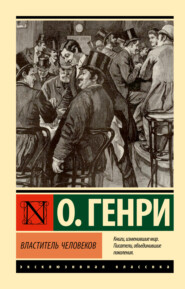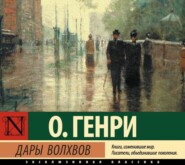По всем вопросам обращайтесь на: info@litportal.ru
(©) 2003-2025.
✖
Whirligigs
Настройки чтения
Размер шрифта
Высота строк
Поля
"You needn't. I like it. I save half my wages, and I'm as hard as a water plug. It beats polo."
"Will it furnish bread and tea and jam for another outcast from civilization?"
"The spring shearing," said the manager, "just cleaned up a deficit in last year's business. Wastefulness and inattention have been the rule heretofore. The autumn clip will leave a small profit over all expenses. Next year there will be jam."
When, about four o'clock in the afternoon, the ponies rounded a gentle, brush-covered hill, and then swooped, like a double cream-coloured cyclone, upon the Rancho de las Sombras, Octavia gave a little cry of delight. A lordly grove of magnificent live-oaks cast an area of grateful, cool shade, whence the ranch had drawn its name, "de las Sombras" – of the shadows. The house, of red brick, one story, ran low and long beneath the trees. Through its middle, dividing its six rooms in half, extended a broad, arched passageway, picturesque with flowering cactus and hanging red earthern jars. A "gallery," low and broad, encircled the building. Vines climbed about it, and the adjacent ground was, for a space, covered with transplanted grass and shrubs. A little lake, long and narrow, glimmered in the sun at the rear. Further away stood the shacks of the Mexican workers, the corrals, wool sheds and shearing pens. To the right lay the low hills, splattered with dark patches of chaparral; to the left the unbounded green prairie blending against the blue heavens.
"It's a home, Teddy," said Octavia, breathlessly; that's what it is – it's a home."
"Not so bad for a sheep ranch," admitted Teddy, with excusable pride. "I've been tinkering on it at odd times."
A Mexican youth sprang from somewhere in the grass, and took charge of the creams. The mistress and the manager entered the house.
"Here's Mrs. MacIntyre," said Teddy, as a placid, neat, elderly lady came out upon the gallery to meet them. "Mrs. Mac, here's the boss. Very likely she will be wanting a hunk of ham and a dish of beans after her drive."
Mrs. MacIntyre, the housekeeper, as much a fixture on the place as the lake or the live-oaks, received the imputation of the ranch's resources of refreshment with mild indignation, and was about to give it utterance when Octavia spoke.
"Oh, Mrs. MacIntyre, don't apologize for Teddy. Yes, I call him Teddy. So does every one whom he hasn't duped into taking him seriously. You see, we used to cut paper dolls and play jackstraws together ages ago. No one minds what he says."
"No," said Teddy, "no one minds what he says, just so he doesn't do it again."
Octavia cast one of those subtle, sidelong glances toward him from beneath her lowered eyelids – a glance that Teddy used to describe as an upper-cut. But there was nothing in his ingenuous, weather-tanned face to warrant a suspicion that he was making an allusion – nothing. Beyond a doubt, thought Octavia, he had forgotten.
"Mr. Westlake likes his fun," said Mrs. Maclntyre, as she conducted Octavia to her rooms. "But," she added, loyally, "people around here usually pay attention to what he says when he talks in earnest. I don't know what would have become of this place without him."
Two rooms at the east end of the house had been arranged for the occupancy of the ranch's mistress. When she entered them a slight dismay seized her at their bare appearance and the scantiness of their furniture; but she quickly reflected that the climate was a semi-tropical one, and was moved to appreciation of the well-conceived efforts to conform to it. The sashes had already been removed from the big windows, and white curtains waved in the Gulf breeze that streamed through the wide jalousies. The bare floor was amply strewn with cool rugs; the chairs were inviting, deep, dreamy willows; the walls were papered with a light, cheerful olive. One whole side of her sitting room was covered with books on smooth, unpainted pine shelves. She flew to these at once. Before her was a well-selected library. She caught glimpses of titles of volumes of fiction and travel not yet seasoned from the dampness of the press.
Presently, recollecting that she was now in a wilderness given over to mutton, centipedes and privations, the incongruity of these luxuries struck her, and, with intuitive feminine suspicion, she began turning to the fly-leaves of volume after volume. Upon each one was inscribed in fluent characters the name of Theodore Westlake, Jr.
Octavia, fatigued by her long journey, retired early that night. Lying upon her white, cool bed, she rested deliciously, but sleep coquetted long with her. She listened to faint noises whose strangeness kept her faculties on the alert – the fractious yelping of the coyotes, the ceaseless, low symphony of the wind, the distant booming of the frogs about the lake, the lamentation of a concertina in the Mexicans' quarters. There were many conflicting feelings in her heart – thankfulness and rebellion, peace and disquietude, loneliness and a sense of protecting care, happiness and an old, haunting pain.
She did what any other woman would have done – sought relief in a wholesome tide of unreasonable tears, and her last words, murmured to herself before slumber, capitulating, came softly to woo her, were "He has forgotten."
The manager of the Rancho de las Sombras was no dilettante. He was a "hustler." He was generally up, mounted, and away of mornings before the rest of the household were awake, making the rounds of the flocks and camps. This was the duty of the major-domo, a stately old Mexican with a princely air and manner, but Teddy seemed to have a great deal of confidence in his own eyesight. Except in the busy seasons, he nearly always returned to the ranch to breakfast at eight o'clock, with Octavia and Mrs. Maclntyre, at the little table set in the central hallway, bringing with him a tonic and breezy cheerfulness full of the health and flavour of the prairies.
A few days after Octavia's arrival he made her get out one of her riding skirts, and curtail it to a shortness demanded by the chaparral brakes.
With some misgivings she donned this and the pair of buckskin leggings he prescribed in addition, and, mounted upon a dancing pony, rode with him to view her possessions. He showed her everything – the flocks of ewes, muttons and grazing lambs, the dipping vats, the shearing pens, the uncouth merino rams in their little pasture, the water-tanks prepared against the summer drought – giving account of his stewardship with a boyish enthusiasm that never flagged.
Where was the old Teddy that she knew so well? This side of him was the same, and it was a side that pleased her; but this was all she ever saw of him now. Where was his sentimentality – those old, varying moods of impetuous love-making, of fanciful, quixotic devotion, of heart-breaking gloom, of alternating, absurd tenderness and haughty dignity? His nature had been a sensitive one, his temperament bordering closely on the artistic. She knew that, besides being a follower of fashion and its fads and sports, he had cultivated tastes of a finer nature. He had written things, he had tampered with colours, he was something of a student in certain branches of art, and once she had been admitted to all his aspirations and thoughts. But now – and she could not avoid the conclusion – Teddy had barricaded against her every side of himself except one – the side that showed the manager of the Rancho de las Sombras and a jolly chum who had forgiven and forgotten. Queerly enough the words of Mr. Bannister's description of her property came into her mind – "all inclosed within a strong barbed-wire fence."
"Teddy's fenced, too," said Octavia to herself.
It was not difficult for her to reason out the cause of his fortifications. It had originated one night at the Hammersmiths' ball. It occurred at a time soon after she had decided to accept Colonel Beaupree and his million, which was no more than her looks and the entrée she held to the inner circles were worth. Teddy had proposed with all his impetuosity and fire, and she looked him straight in the eyes, an said, coldly and finally: "Never let me hear any such silly nonsense from you again." "You won't," said Teddy, with an expression around his mouth, and – now Teddy was inclosed within a strong barbed-wire fence.
It was on this first ride of inspection that Teddy was seized by the inspiration that suggested the name of Mother Goose's heroine, and he at once bestowed it upon Octavia. The idea, supported by both a similarity of names and identity of occupations, seemed to strike him as a peculiarly happy one, and he never tired of using it. The Mexicans on the ranch also took up the name, adding another syllable to accommodate their lingual incapacity for the final "p," gravely referring to her as "La Madama Bo-Peepy." Eventually it spread, and "Madame Bo-Peep's ranch" was as often mentioned as the "Rancho de las Sombras."
Came the long, hot season from May to September, when work is scarce on the ranches. Octavia passed the days in a kind of lotus-eater's dream. Books, hammocks, correspondence with a few intimate friends, a renewed interest in her old water-colour box and easel – these disposed of the sultry hours of daylight. The evenings were always sure to bring enjoyment. Best of all were the rapturous horseback rides with Teddy, when the moon gave light over the wind-swept leagues, chaperoned by the wheeling night-hawk and the startled owl. Often the Mexicans would come up from their shacks with their guitars and sing the weirdest of heart-breaking songs. There were long, cosy chats on the breezy gallery, and an interminable warfare of wits between Teddy and Mrs. MacIntyre, whose abundant Scotch shrewdness often more than overmatched the lighter humour in which she was lacking.
And the nights came, one after another, and were filed away by weeks and months – nights soft and languorous and fragrant, that should have driven Strephon to Chloe over wires however barbed, that might have drawn Cupid himself to hunt, lasso in hand, among those amorous pastures – but Teddy kept his fences up.
One July night Madame Bo-Peep and her ranch manager were sitting on the east gallery. Teddy had been exhausting the science of prognostication as to the probabilities of a price of twenty-four cents for the autumn clip, and had then subsided into an anesthetic cloud of Havana smoke. Only as incompetent a judge as a woman would have failed to note long ago that at least a third of his salary must have gone up in the fumes of those imported Regalias.
"Teddy," said Octavia, suddenly, and rather sharply, "what are you working down here on a ranch for?"
"One hundred per," said Teddy, glibly, "and found."
"I've a good mind to discharge you."
"Can't do it," said Teddy, with a grin.
"Why not?" demanded Octavia, with argumentative heat.
"Under contract. Terms of sale respect all unexpired contracts. Mine runs until 12 P. M., December thirty-first. You might get up at midnight on that date and fire me. If you try it sooner I'll be in a position to bring legal proceedings."
Octavia seemed to be considering the prospects of litigation.
"But," continued Teddy cheerfully, "I've been thinking of resigning anyway."
Octavia's rocking-chair ceased its motion. There were centipedes in this country, she felt sure; and Indians, and vast, lonely, desolate, empty wastes; all within strong barbed-wire fence. There was a Van Dresser pride, but there was also a Van Dresser heart. She must know for certain whether or not he had forgotten.
"Ah, well, Teddy," she said, with a fine assumption of polite interest, "it's lonely down here; you're longing to get back to the old life – to polo and lobsters and theatres and balls."
"Never cared much for balls," said Teddy virtuously.
"You're getting old, Teddy. Your memory is failing. Nobody ever knew you to miss a dance, unless it occurred on the same night with another one which you attended. And you showed such shocking bad taste, too, in dancing too often with the same partner. Let me see, what was that Forbes girl's name – the one with wall eyes – Mabel, wasn't it?"
"No; Adéle. Mabel was the one with the bony elbows. That wasn't wall in Adéle's eyes. It was soul. We used to talk sonnets together, and Verlaine. Just then I was trying to run a pipe from the Pierian spring."
"You were on the floor with her," said Octavia, undeflected, "five times at the Hammersmiths'."
"Hammersmiths' what?" questioned Teddy, vacuously.
"Ball – ball," said Octavia, viciously. "What were we talking of?"
"Eyes, I thought," said Teddy, after some reflection; "and elbows."
"Those Hammersmiths," went on Octavia, in her sweetest society prattle, after subduing an intense desire to yank a handful of sunburnt, sandy hair from the head lying back contentedly against the canvas of the steamer chair, "had too much money. Mines, wasn't it? It was something that paid something to the ton. You couldn't get a glass of plain water in their house. Everything at that ball was dreadfully overdone."
"It was," said Teddy.
"Such a crowd there was!" Octavia continued, conscious that she was talking the rapid drivel of a school-girl describing her first dance. "The balconies were as warm as the rooms. I – lost – something at that ball." The last sentence was uttered in a tone calculated to remove the barbs from miles of wire.
"So did I," confessed Teddy, in a lower voice.
"A glove," said Octavia, falling back as the enemy approached her ditches.
"Caste," said Teddy, halting his firing line without loss. "I hobnobbed, half the evening with one of Hammersmith's miners, a fellow who kept his hands in his pockets, and talked like an archangel about reduction plants and drifts and levels and sluice-boxes."

















